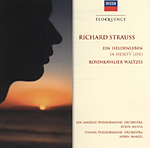Zubin Mehta launches Ein Heldenleben with plenty of gusto, but without the tremendous sweep and projection of Fritz Reiner’s enduringly classic Chicago version on RCA (but then, no one else has it either). The most striking feature of this performance is its exposed inner details. Rarely have we heard the contrapuntal lines of “The Hero’s Works of Peace” so clearly (and for the first time the “Macbeth” quotation is completely discernable). “The Hero’s Adversaries” here resembles Schoenberg’s Chamber Symphony No.1, with woodwind squawking so realistically that I was reminded of a visit to Miami’s Parrot Jungle. This emphasis on clarity pays fewer dividends in “The Hero’s Deeds of War”, where ferocity is sacrificed for detail. David Frisina’s violin solo in “The Hero’s Companion” flows more freely than most (but I still find this section too long, and wish for a version in which after one minute of Pauline Strauss’ carping we would hear a string break, followed by the sound of a violin being stomped on, and then cut immediately to the climax of the love music). The Los Angeles Philharmonic plays beautifully for Mehta, and while this recording doesn’t join the exclusive club of Reiner, Kempe (EMI), Karajan (Deutsche Grammophon) and Pesek (Virgin), its virtues rate your consideration. As a bonus, Eloquence has included Lorin Maazel’s fine Vienna Philharmonic performance of the first Rosenkavalier waltz sequence (which cuts the orgasmic whooping of the horns in the opening). The sound on both recordings is clear, but dynamically limited.
































